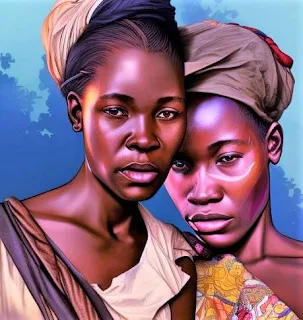Food Stand Opps Turned Friends
The lesson in the story Food Stand Opps Turned Friends is that competition doesn't always have to be about winning or losing. Sometimes, it's better to collaborate and work together to create something even better than what you could have done alone. Asha and Nala were both incredibly talented food vendors, and when they came together, they were able to create a dish that combined the best of both of their specialties. By working together, they were able to achieve even greater success and create something truly unique and delicious.
Food Stand Opps Turned Friends.
In the bustling city of Accra, there were two food vendors named Asha and Nala. They both had their small food stands on the busiest street in Ghana, where they sold their delicious dishes to hungry customers passing by.
Asha's stand was known for its mouth-watering jollof rice, spicy grilled chicken, and savory beef stew. Her customers would always rave about the bold flavors and spices in her dishes. Meanwhile, Nala's stand was famous for its sweet treats, such as coconut rice pudding, fried plantains with honey, and banana bread. Her customers couldn't get enough of the sweet and decadent flavors.
One day, a traveler came to the city and decided to try both Asha's and Nala's stands. He was impressed by the quality of their food and couldn't decide which one he liked best. So, he came up with an idea to hold a cooking competition between the two vendors.
Asha and Nala accepted the challenge, and they began preparing for the competition. Asha decided to make her famous jollof rice with grilled chicken, while Nala made her signature coconut rice pudding with fried plantains and honey.
On the day of the competition, the street was buzzing with excitement. The people of Accra came out to see the cooking challenge between the two food vendors. Asha and Nala cooked with passion, and their dishes were both delicious and unique.
The customers sampled the dishes and cast their votes. The competition was fierce, but in the end, it was declared a tie. Asha and Nala were both equally talented and deserving of recognition for their skills.
But instead of competing against each other, they decided to collaborate and create a new dish that combined their specialties. They came up with a dish called "Sweet and Spicy," which was a fusion of jollof rice with grilled chicken, topped with a drizzle of honey and served with a side of fried plantains.
Their new dish was an instant hit with the customers, and Asha and Nala became the talk of the town. People would often say, "If you want the best of both worlds, go to Asha and Nala's food stands."
From that day on, the two vendors became the best of friends, and they continued to cook together and delight their customers with their unique and delicious dishes. They proved that when you combine your talents and work together, you can create something truly special.
The story Food Stand Opps Turned Friends is about two food vendors named Asha and Nala who sold their delicious dishes on the busiest street in Ghana. They were challenged by a traveler to a cooking competition, which resulted in a tie. Instead of competing against each other, they decided to collaborate and create a new dish called "Sweet and Spicy." The dish became an instant hit, and Asha and Nala became the talk of the town. They learned that by combining their talents and working together, they could create something truly special, and they became the best of friends. The story teaches the importance of collaboration and cooperation to achieve success.
More links to articles you will find thought provoking.





